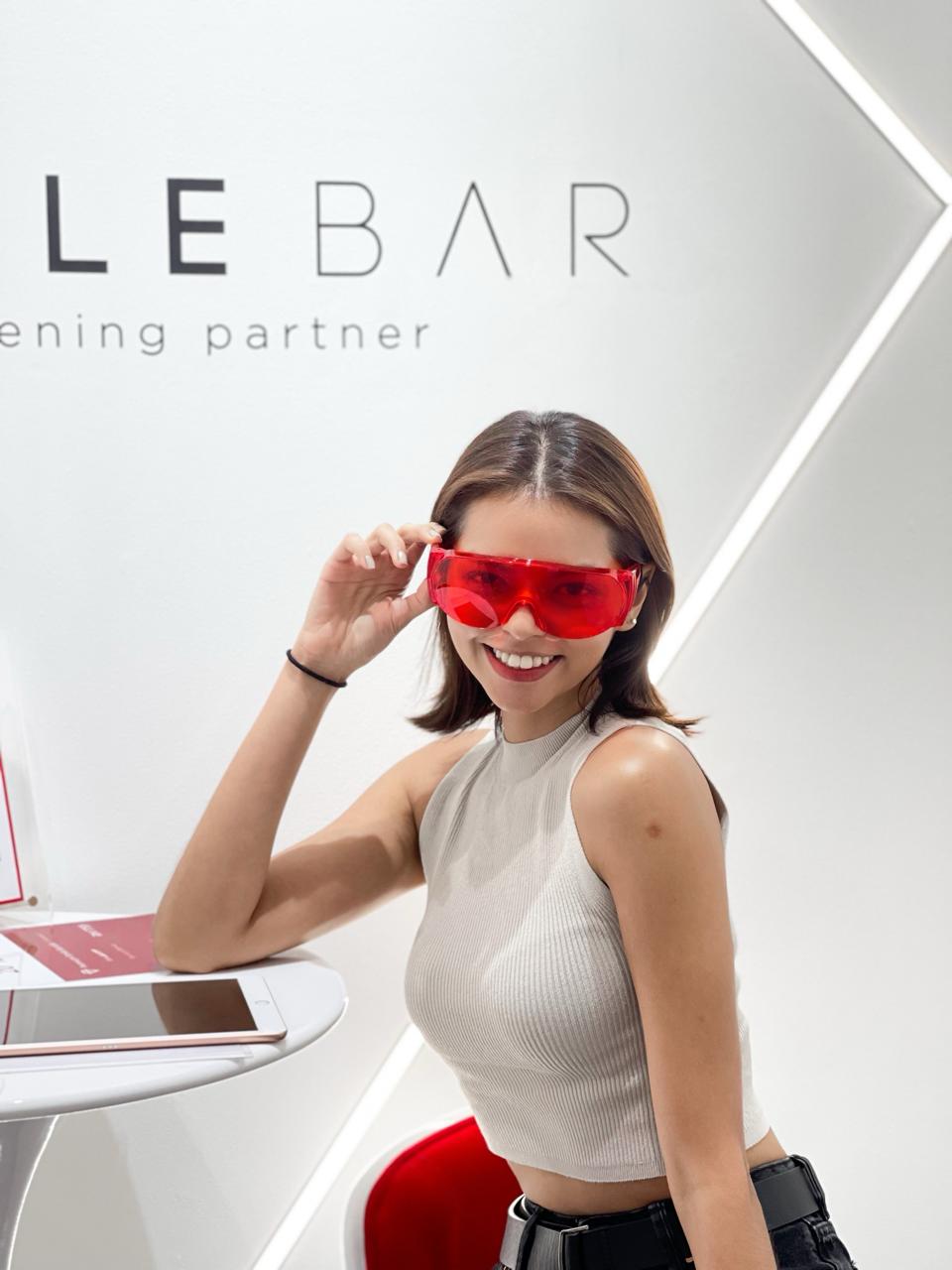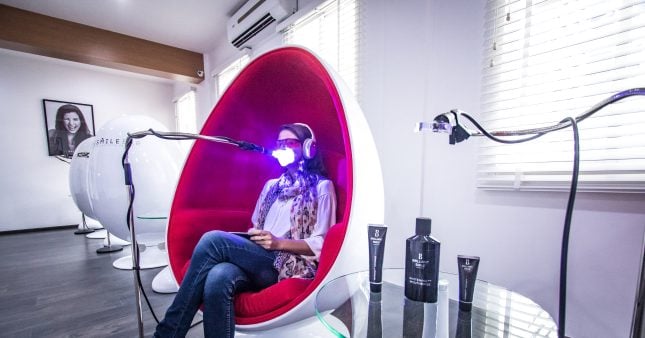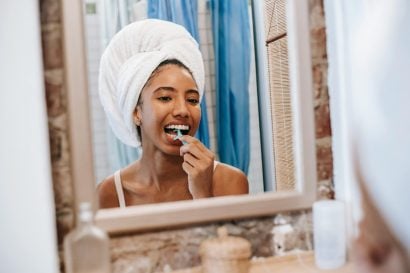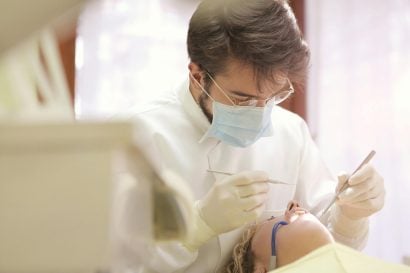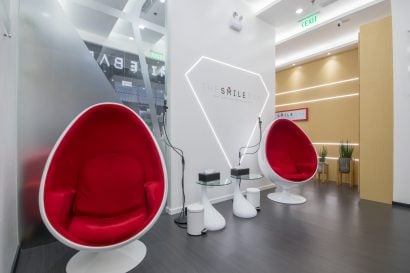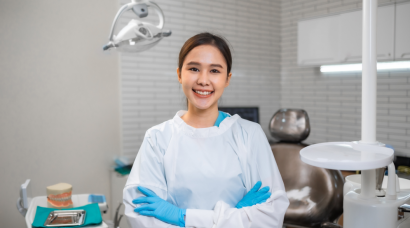How safe is teeth whitening?
Teeth whitening is generally safe when performed correctly — especially under professional supervision. The safety of the procedure depends on the method used, the condition of your teeth, and the expertise of the provider.
In Bangkok, premium whitening studios like The Smile Bar use LED technology and dentist-approved gels that protect enamel and reduce sensitivity. Their in-office treatments are not only effective but also tailored to each individual, making them a trusted option for those looking to whiten their teeth safely.
How The Procedure Works — And Why Safety Matters
Tooth whitening treatments rely on bleaching agents—commonly hydrogen or carbamide peroxide—to lift stains and brighten your smile. The safety of the treatment depends on the whitening method, the strength of the agent, and the condition of your teeth and gums.
Professional whitening, especially at clinics like The Smile Bar Bangkok, is considered safe and effective when overseen by certified dental professionals. These experts assess whether treatment is suitable for you, especially if you have sensitivity, crowns, or underlying issues.
Tooth discoloration can be extrinsic (food, drinks, smoking) or intrinsic (aging, medications, trauma). Whitening products work best on extrinsic stains, while deeper stains may require in-office treatments.
Tooth bleaching can cause damage if overused or misapplied, which is why it’s vital to consult your dentist before starting any whitening procedure.

A shade guide helps track whitening progress and choose the brightness level that looks natural for you.
Professional Teeth Whitening vs. At-Home Teeth Whitening Kits
When comparing professional teeth whitening with at-home products like strips, trays, or whitening toothpaste, safety and results differ. Over-the-counter options may promise whiter teeth, but often cause sensitivity and gum irritation. Results can be uneven, and whitening toothpaste may only remove surface stains.
At The Smile Bar, in-office whitening uses LED technology that activates the gel safely and effectively. It protects enamel and delivers visible results in just one session, using products sourced from Europe and Scandinavia.
At-home trays can be inconsistent. Custom-fitted trays used in-clinic ensure even gel distribution and a brighter smile. Treatments are also suitable for sensitive teeth, thanks to desensitising gels and real-time monitoring.
Risks of Teeth Whitening: What You Should Know
Like any cosmetic procedure, teeth whitening includes potential risks and side effects. These can include:
- Temporary sensitivity in your teeth
- Gum irritation
- Enamel erosion if products are misused
The most common side effect is tooth sensitivity, especially for those who already have sensitive teeth. A professional teeth whitening includes a pre-screening and enamel-safe gels to help minimise this risk.
Teeth whitening is generally safe when done under the supervision of a dentist or certified specialist. However, it should be avoided if you have active cavities, gum disease, or visible crowns that are whiter than your natural teeth—since whitening can’t make your natural teeth match a crown. If your crown is more yellow, whitening may help balance your smile.
Whitening Treatment Safety: What Sets Bangkok Clinics Apart
In Bangkok, teeth whitening options range from high-end dental studios to budget beauty salons. But not all whitening treatments are equal. Budget salons might skip crucial safety steps like sterilising equipment or using regulated whitening products.
Premium clinics like The Smile Bar follow international standards:
-
Use only certified tooth whitening products
-
Employ trained dental professionals
-
Maintain sterile tools and hygienic interiors
Whitening treatments are safe at clinics that prioritise both aesthetic results and oral health. The Smile Bar’s environment—with surgical-grade surfaces, sealed equipment, and Scandinavian design—is built for both comfort and clinical precision.

LED technology safely lifts stains without damaging enamel and can deliver up to 9 shades whiter in one visit.
How LED Whitening Works Without Damaging Tooth Enamel
The LED whitening procedure uses calibrated light waves to activate the whitening agent without heat or UV exposure. This means it doesn’t damage your teeth or cause inflammation. Unlike traditional whitening strip products or UV methods, LED systems are safer for tooth enamel.
Tooth whitening products used by The Smile Bar include stabilizers that protect your enamel, maintain hydration, and reduce the chance of post-whitening brittleness. These whitening gels are part of a well-balanced system designed to whiten your teeth without side effects.
Ready to experience safe, effective LED whitening in Bangkok? Learn more about our whitening options and book a visit here.
Real Results: Before and After Teeth Whitening in Bangkok
Client testimonials and before/after galleries reveal the natural, glowing results that follow a whitening treatment at The Smile Bar. These real-world outcomes reinforce the safety and effectiveness of their approach.
The studio’s 2,245+ Google reviews and 4.9-star rating reflect high satisfaction with both the appearance of your teeth and the comfort of the experience. Clients consistently note the ease of the procedure and the long-lasting brightness.
Teeth Before and After Whitening Treatment at The Smile Bar Bangkok.
What to Expect During and After Whitening Treatment
A typical whitening session at The Smile Bar takes 60–90 minutes. Your treatment includes LED light activation and the application of desensitising gels to minimise discomfort. While polishing is not included by default, it is available as an optional add-on before the whitening treatment for those who want to enhance results.
Mild side effects like tooth sensitivity may occur but usually resolve within 24–48 hours.
Different Types of Teeth Whitening Explained
In-Office Teeth Whitening
- This is the most advanced and effective way to whiten your teeth. It’s done in a professional setting with high-quality whitening agents and LED technology. In-office teeth whitening delivers fast, noticeable results with less risk of side effects, as everything is monitored in real time.
At-Home Teeth Whitening Options
- These include whitening strips, whitening toothpaste, gel trays, and whitening pens. While convenient, these methods often take longer, provide less consistent results, and come with a higher risk of misuse or tooth sensitivity if not guided by a dentist.
Natural and Alternative Whitening Methods
- Some people explore DIY solutions like activated charcoal, baking soda, or oil pulling. However, there’s limited scientific support for these, and they may cause enamel abrasion or irritation if not used cautiously. Always speak with your dentist before trying alternative whitening methods.
Tooth Sensitivity and Whitening—What You Need to Know
Tooth sensitivity is a common concern when it comes to teeth whitening. Whitening agents can temporarily expose the microscopic channels in enamel, leading to heightened sensation.
At The Smile Bar, this is addressed using specially formulated gels and tailored treatment plans. Clients with known sensitivity are pre-screened and receive a modified approach with lower peroxide levels or additional protective agents.
Managing Sensitivity After Whitening
- Use high quality toothpaste formulated for sensitive teeth
- Avoid extremely hot or cold foods for 24–48 hours
- Follow all post-whitening care instructions
Mild sensitivity is normal but should subside quickly. If it doesn’t, clients can return for additional enamel-supportive treatments.
Why Talking to Your Dentist Before Whitening Matters
Before you begin any tooth whitening procedure, it’s essential to consult with a dental professional. Your dentist can:
-
Identify existing conditions like decay, gum disease, or worn enamel
-
Evaluate whether you have crowns or fillings that won’t whiten
-
Recommend the best type of whitening for your tooth type
At The Smile Bar, each client undergoes a consultation to ensure the treatment will be safe and effective. Skipping this step is one of the most common causes of poor outcomes or increased sensitivity in DIY whitening attempts.
Safe and Effective Whitening at The Smile Bar Bangkok
Tooth whitening is a popular cosmetic treatment—but it should always be done right. A safe whitening procedure includes:
- Dentist-approved whitening products
- LED light activation
- Sterilised tools
- Trained staff
- Aftercare support
At The Smile Bar Bangkok, tooth whitening treatments are designed for results you can see and safety you can trust. Whether you’re a Bangkok local or visiting Thailand, it’s the smart choice for anyone who wants a whiter smile without the risks of teeth whitening gone wrong.
Conclusion – TL;DR
Teeth whitening is safe when done professionally—especially with LED systems and dentist-approved gels. At The Smile Bar Bangkok, treatments are designed to protect enamel, reduce sensitivity, and deliver visible results. For a whiter smile without the risks, expert care makes all the difference.
Frequently Asked Questions
Is teeth whitening safe for sensitive teeth?
- Yes—when performed professionally with the right whitening products and care. At The Smile Bar, your sensitivity is assessed before treatment begins, and desensitising gels are applied to protect your enamel.
How long do whitening results last?
- Results can last several months, depending on your diet, lifestyle, and oral hygiene. You’ll receive personalised aftercare tips to help maintain a brighter smile.
What are the risks of teeth whitening?
- Possible side effects include temporary tooth sensitivity, gum irritation, or enamel erosion—especially if over-the-counter products are misused. A consultation with a certified professional helps avoid these issues.
Can yellow teeth be white again?
- Yes, yellow teeth can often be whitened effectively—especially when the discoloration is caused by coffee, tea, smoking, or other external factors. In-office treatments in Bangkok deliver fast, noticeable improvements.
Are LED teeth whitening treatments safe?
- Yes—LED whitening is considered one of the safest cosmetic methods. It uses calibrated light waves to activate the whitening gel without heat or UV exposure, minimising the risk to your enamel.
Is teeth whitening safe during pregnancy or breastfeeding?
- Most dental professionals recommend postponing elective cosmetic procedures like whitening during pregnancy or breastfeeding. While no proven harm has been established, it’s best to consult your dentist or physician before proceeding.
What whitening methods are safest for enamel?
- Professional in-office treatments using pH-balanced, peroxide-based gels and enamel-safe stabilisers are the safest. The Smile Bar’s systems are designed specifically to protect enamel while achieving visible results.
Are at-home whitening strips safe?
- They can be safe if used correctly, but often lead to uneven results or increased sensitivity. Professional alternatives are safer, more consistent, and more comfortable—especially for people with sensitive teeth.
Is professional teeth whitening worth it?
- Yes—if you want fast, even, and long-lasting results with minimal risk. Clinics like The Smile Bar Bangkok offer premium whitening that combines safety, comfort, and aesthetic results.
What are the best ways to whiten your teeth?
- In-office whitening is the most effective way to achieve a brighter smile quickly and safely. Whitening toothpastes and strips can help with surface stains but cannot match the results of professional treatment.
